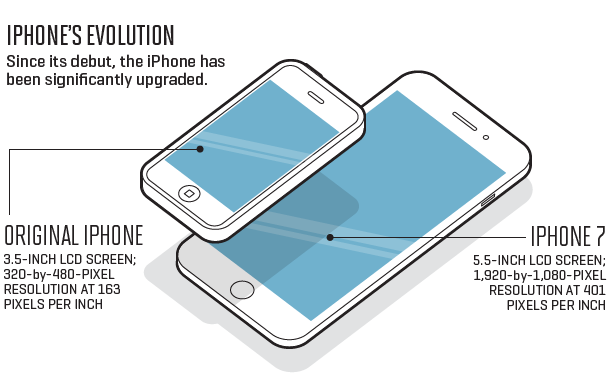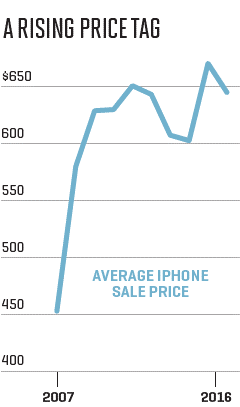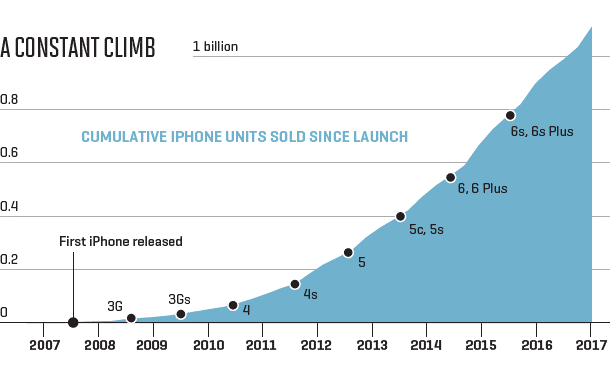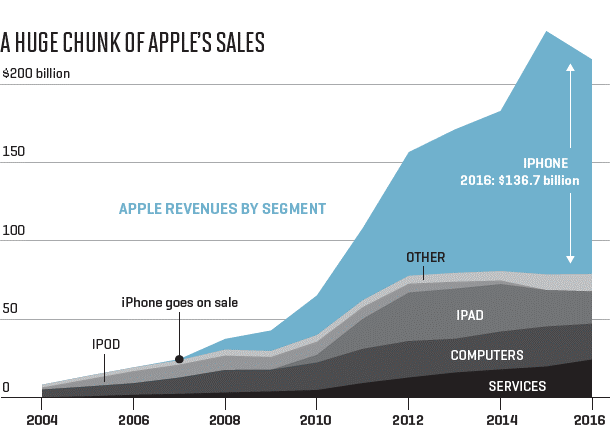回顧iPhone十年

圖片提供:Nicolas Rapp
?
|
誰能想到,,革新手機(jī)產(chǎn)業(yè)并最終引領(lǐng)一代文化的iPhone,,最初設(shè)計的原因竟是厭惡。蘋果公司前首席執(zhí)行官史蒂夫·喬布斯考慮設(shè)計iPhone時發(fā)現(xiàn),,大部分人都很討厭自己的手機(jī),。 “每個人都有手機(jī),但我沒發(fā)現(xiàn)有誰真心喜歡手機(jī),,”喬布斯曾對皮克斯動畫首席創(chuàng)意官約翰·拉塞特說,。 為了設(shè)計出人們真心會喜歡的手機(jī),,喬布斯做出了大膽創(chuàng)新:觸摸屏,。大屏幕呈現(xiàn)是實現(xiàn)掌中設(shè)備多功能的關(guān)鍵:一會兒可以用來打電話,一會兒可以拍照,,再過會又能玩游戲,。 |
The design for the device that would revolutionize mobile phones and, eventually, the culture at large, arose from hatred. When considering whether to create the iPhone, Apple CEO Steve Jobs found that people largely despised the phones that they had. “Everybody has a cell phone, but I don’t know one person who likes their cell phone,” he once told John Lasseter, Pixar’s chief creative officer. To create a phone people would actually love, Jobs latched onto an important innovation: the touch screen. The display was the key to creating a computing chameleon: a device that could be a phone one minute, a camera the next, and a gaming pad the next. |

原始iPhone與iPhone 7的區(qū)別| 圖片提供:Nicolas Rapp
|
2007年1月,主持大師喬布斯向世人推介iPhone,,宣傳語寫得極妙,。“今天,我們要推出三件革新性產(chǎn)品,,”剛開始喬布斯有意誤導(dǎo)大眾,,后來才解釋稱因為iPhone結(jié)合了三種功能:手機(jī)、iPod和網(wǎng)絡(luò)設(shè)備,。微軟首席執(zhí)行官史蒂夫·鮑爾默笑了,。曾介紹“創(chuàng)造性毀滅”概念的哈佛商學(xué)院教授克萊頓·克里斯滕森撓了撓頭。但隨后1月29日iPhone正式推出時,,公眾沒有半點質(zhì)疑,。十年后,很顯然當(dāng)時批評iPhone的人都錯了,,用戶是對的,。 一開始iPhone銷售就很好,等到蘋果推出第二代型號iPhone 3G,,調(diào)低價格到199美元并增加無線網(wǎng)絡(luò)合約版,,銷量更是激增。 更重要的是,,一年后蘋果推出了喬布斯先前拒絕的功能:應(yīng)用商店App Store,。通過應(yīng)用商店用戶可以購買并安裝第三方開發(fā)的移動應(yīng)用,由此推動了大規(guī)模創(chuàng)新,,也解鎖了嶄新的商業(yè)模式,。 |
The master showman unveiled his smartphone in January 2007 with one of the most brilliant sales pitches ever. “Today, we’re introducing three revolutionary products,” Jobs said with a bit of misdirection, as the iPhone would be all three: phone, iPod, and Internet device. Steve Ballmer, then Microsoft’s CEO, laughed. Clayton Christensen, the Harvard business professor who turned the world on to the notion of “creative destruction,” scratched his head. But the public’s reaction after the iPhone’s release on June 29 was anything but skeptical. Ten years later, it’s clear that the critics were wrong. Consumers were right. Again. Sales started briskly and then went into overdrive after Apple cut the starting price of its second model, the iPhone 3G, to $199 with a wireless contract. More important, one year in, Apple introduced a critical new feature that Jobs had initially resisted: the App Store. It enabled iPhone users to buy and install mobile programs from third-party developers directly to their phones, unleashing a wave of creativity and new business models. |

iPhone十年來的價格變化 | 圖片提供:Nicolas Rapp?
|
長期跟蹤行業(yè)的伯恩斯坦研究公司分析師托尼·薩科納吉表示,iPhone的魅力在于實現(xiàn)了“口袋便攜電腦”,,而且使用體驗非常好,。 有iPhone相助,移動通訊在WhatsApp和Snapchat等應(yīng)用的助推下從宅人小眾口味變成一種文化現(xiàn)象,。社交巨頭推特和Facebook也借機(jī)推向巨大的新市場,。憤怒的小鳥之類游戲賺得盆滿缽滿,優(yōu)步之類共享汽車平臺也一夜成名,。 iPhone出現(xiàn)早期,,蘋果搶占的是傳統(tǒng)手機(jī)的蛋糕。據(jù)互聯(lián)網(wǎng)數(shù)據(jù)中心(IDC)統(tǒng)計,,到2009年底iPhone已經(jīng)占全世界手機(jī)銷量七分之一,。但隨著蘋果大肆攻占黑莓、諾基亞和微軟的地盤,,谷歌也跟隨iPhone腳步開始加緊研發(fā)手機(jī),,并推出了移動操作系統(tǒng)安卓。 谷歌賭對了,。 跟蘋果的路子不一樣,,谷歌召集了多家影響力更大資金也更充足的手機(jī)運營商,。谷歌還與三星等多家硬件廠商合作,研發(fā)出更精良的安卓手機(jī),,設(shè)計樣式也更繁多,。 |
The magic of the iPhone was putting “the power of a computer in one’s pocket” and then making it easy to use, says longtime analyst Toni Sacconaghi at Bernstein Research. With help from the iPhone, mobile messaging grew from a nerdy niche to a cultural phenomenon with WhatsApp and Snapchat. Social networks Twitter and Facebook gained big new markets. Games like Angry Birds minted money while ride-sharing app Uber burst onto the scene. During the iPhone’s early years, Apple ate the cell phone industry’s lunch. By the end of 2009, iPhones accounted for one of every seven smartphones sold worldwide, according to IDC. But as Apple lapped BlackBerry, Nokia, and Microsoft, Google started its own push into mobile phones that was inspired by the iPhone and introduced mobile operating system Android. The gamble paid off. Unlike Apple, Google courted multiple phone carriers with promises of greater influence and more money. Google also worked with multiple hardware makers including Samsung, leading to better Android phones and a greater variety of designs. |

iPhone的累積銷量| 圖片提供:Nicolas Rapp??
|
到2010年,搭載安卓手機(jī)的設(shè)備已經(jīng)超過運行iOS系統(tǒng)的iPhone,。三星的大屏幕手機(jī)一直為安卓系統(tǒng)產(chǎn)生收益,,但蘋果沒能及時意識到競爭對手的強(qiáng)大。到去年,,谷歌安卓系統(tǒng)已經(jīng)占據(jù)市面上六分之五的智能手機(jī),。 蘋果自己也遭遇不少風(fēng)波,例如2010年的“天線門”,,當(dāng)時很多用戶反饋天線問題但起初喬布斯置之不理,。但即便安卓很成功,iPhone銷量也一路攀升,。2010年蘋果iPhone銷量較前一年幾乎翻倍,,2011年再次翻倍,之后保持年均25%的增速,,一直到2015年達(dá)到峰值,,銷量近2.32億部。 |
By 2010, more Android-based phones were being sold than those running the iPhone’s iOS system. Spurring further gains for Android, Apple didn’t quickly recognize the appeal of Samsung’s large-screen phones. By last year, the Google—supplied software powered more than five out of six smartphones. There were other hiccups for Apple, like “Antennagate” in 2010, when Jobs dismissed customer complaints about reception problems with the iPhone. But even with Android’s success, iPhone sales kept climbing. Apple sold almost twice as many iPhones in 2010 than in the year prior, doubled sales again in 2011, and kept growing an average of 25% annually to a peak of nearly 232 million in 2015. |

iPhone的銷量收入對蘋果越來越重要| 圖片提供:Nicolas Rapp???
|
然而近來iPhone銷量增長還是停滯了,。連續(xù)兩年推出小修小補(bǔ)版本新手機(jī)后,,2016年蘋果售出2.15億部iPhone,也是首次年度下降,。另外,,蘋果決定不一味迎合大批中國新貴的需求,也影響了部分銷量,。 現(xiàn)在關(guān)于最新款iPhone的謠言甚囂塵上,,據(jù)說iPhone十周年之際會推出更大更亮的無邊框屏幕;雙面玻璃,;以及無線充電功能,。或許又到了懷念喬布斯最心愛手機(jī)的時候了,。(財富中文網(wǎng)) 圖表數(shù)據(jù)來源:彭博,;戰(zhàn)略分析公司;蘋果報表 譯者:Pessy 審校:夏林 本文另一版本將刊登于2017年6月1日出版的《財富》雜志 |
Still, more recently, the iPhone’s growth has stalled. Apple sold 215 million phones in 2016, its first annual decline, after making only minor tweaks over the previous two years. Sales have also been held back by Apple’s decision not to chase a crop of cheaper Chinese upstarts. The rumor mill is already churning about the next possible iPhone, a 10th-anniversary edition with a bigger, brighter edge-to-edge screen; glass casing; and wireless charging. Maybe it will be enough to put Jobs’ beloved phone back on top. Graphics Sources: Bloomberg; Strategy Analytics; Apple Filings A version of this article appears in the June 1, 2017 issue of Fortune. |
-
熱讀文章
-
熱門視頻











